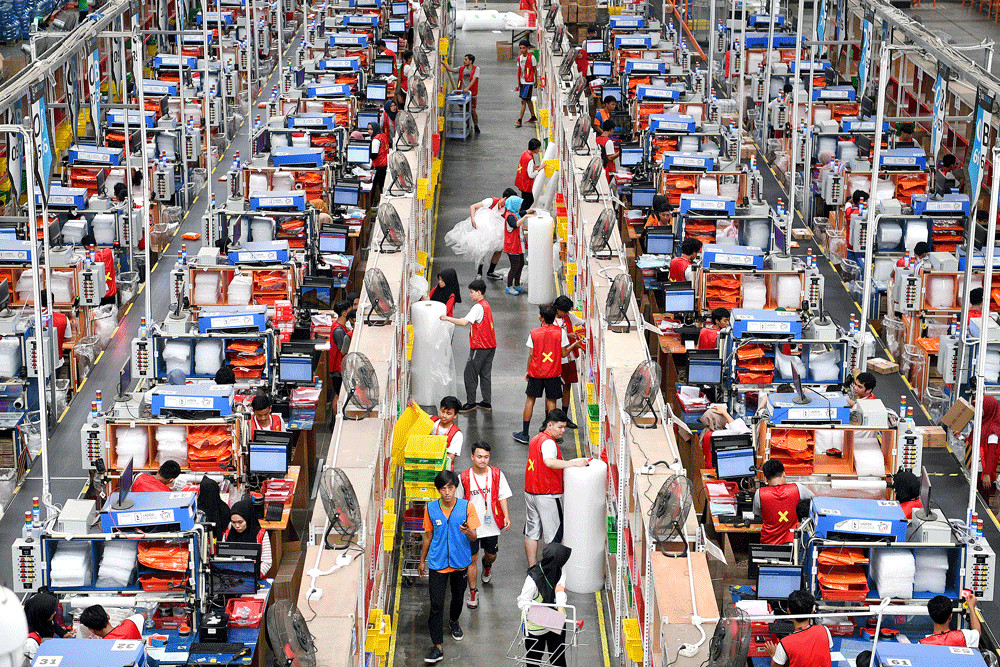Popular Reads
Top Results
Can't find what you're looking for?
View all search resultsPopular Reads
Top Results
Can't find what you're looking for?
View all search resultsCOVID-19 helps create new normal in online shopping: Survey
Thirty percent of the survey respondents said they were new to online marketplaces, 40 percent of whom said they would keep using e-commerce after the outbreak was over.
Change text size
Gift Premium Articles
to Anyone
T
he COVID-19 outbreak, which has disrupted almost all business sectors in the country, has had a positive impact on the e-commerce sector as the virus has created a new normal in online shopping habits, a survey indicates.
A recent survey by management consulting company Redseer showed that Indonesia’s e-commerce growth trajectory would remain positive with an expected 50 percent year-on-year growth to reach US$35 billion this year from $23 billion in 2019.
The e-Conomy SEA 2019 report by Google, Temasek and Bain & Company even predicted that Indonesia’s internet economy was well on track to cross the $130 billion mark by 2025.
“E-commerce platforms are receiving a new cohort of consumers during the pandemic which enables such growth,” Redseer Southeast Asia partner Roshan Raj Behera told The Jakarta Post on Monday.
He went on to say that around 30 percent of the survey respondents said they were new to online marketplaces, 40 percent of whom said they would keep using e-commerce after the outbreak was over.
“Even when the macroeconomic situation still looking bad but the pandemic is under control and there is no second wave, people have hope and are more likely to continue to spend,” Behera said.
He added that the number of e-commerce users may decline within the next few weeks as the government began to ease social distancing measures, enabling people to go out including to shop. However, consumers will use e-commerce platforms again in the fourth quarter due to events such as Online Shopping Day (Harbolnas), which falls in December.
Similarly, Redseer Southeast Asia director Marigank Gutgutia said the fourth quarter was very important to Indonesian e-commerce as more online shopping events would be held to attract new users, which rolled out to the first quarter of 2020.
“Our interviews with consumers reveal that there are also a lot of new consumers in groceries e-commerce,” he said, adding that more than half of the respondents had tried an e-groceries platform during the pandemic.
Homegrown e-groceries marketplaces have been thriving since the COVID-19 outbreak in March as people avoid shopping in supermarkets.
Gutgutia went on to say that electronics had been a key growth contributor across e-commerce platforms, but during the first quarter of 2020 categories such as beauty, fashion and personal care had been on the rise.
Redseer forecast that household appliances and personal care products were expected to be the leading growth categories over the short to medium term driven by the impact of COVID-19.
It further calculated that e-groceries gross merchandise value (GMV) would grow 400 percent this year, while beauty and personal care would grow 80 percent, fashion 40 percent while electronics would grow 20 percent.
“We are also seeing market behavior changes. People usually use online marketplace to buy electronics but now they are buying daily needs such as personal care and food,” said Bukalapak’s display marketing head Anugrah Mardi Honesty during a webinar on Tuesday.
He went on to say that in an attempt to leverage the demand and increase profitability, Bukalapak has been partnering with fast-moving consumer goods (FMCG) brands.
Similarly, unicorn e-commerce firm Tokopedia noted that health and personal care sales had tripled in March and the number of sellers within that category had more than doubled in the same month.
Tokopedia's external communication senior lead Ekhel Chandra Wijaya said that health, household supplies and food and beverages had been the top selling categories since March.
“Hand sanitizer, vitamins and face masks are definitely the most sought-after health products during the pandemic,” he said.
The Redseer survey also showed that 70 percent of online sellers in Indonesia expect the effect of COVID-19 on the industry to last less than two months, or until around July.
A similar survey by the Mobile Marketing Association also showed that e-commerce and the FMCG sectors were among the most optimistic about their industry's ability to recover rapidly from the outbreak.










